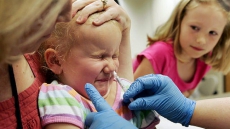TORONTO — Canadian scientists have discovered how to turn a simple blood sample into a variety of nerve cells, including those that are responsible for pain, numbness and other sensations.
The technology will allow researchers to test potential drugs for treating pain using the nerve cells in a lab, all based on an individual patient's own genetic signature, said Mick Bhatia, who led the team of researchers at McMaster University in Hamilton.
"Now we can take easy to obtain blood samples and make the main cell types of neurological systems — the central nervous system and the peripheral nervous system — in a dish that is specialized for each patient," said Bhatia, director of McMaster's Stem Cell and Cancer Research Institute.
"Nobody has ever done this with adult blood, ever."
The technique involves extracting stem cells from blood, which are then converted into neural stem cells using a patented technique. These stem cells are then manipulated in the lab to give rise to several types of nerve cells, including those that make up the peripheral nervous system throughout the arms, legs and the rest of the body.
"We can actually take a patient's blood sample, as routinely performed in a doctor's office, and with it we can produce one million sensory neurons," said Bhatia. "We can also make central nervous system cells."
The researchers hope to discover new pain drugs that take aim only at the peripheral nerve system, while not affecting the brain and the rest of the central nervous system, as standard opioids and narcotics do.
"You don't want to feel sleepy or unaware, you just want your pain to go away," said Bhatia.
"But up until now, no one's had the ability and required technology to actually test different drugs to find something that targets the peripheral nervous system and not the central nervous system in a patient-specific or personalized manner."
His lab hopes to further develop the blood-generated neural stem cells into motor and other kinds of neurons that could conceivably one day be transplanted into patients to restore healthy brain cells as a treatment for Alzheimer's, Parkinson's or Lou Gehrig's disease, for instance.
The technology could also be used to produce retinal nerve cells to treat people who are losing their sight due to age-related macular degeneration, he said.
The research was published Thursday in the journal Cell Reports.





